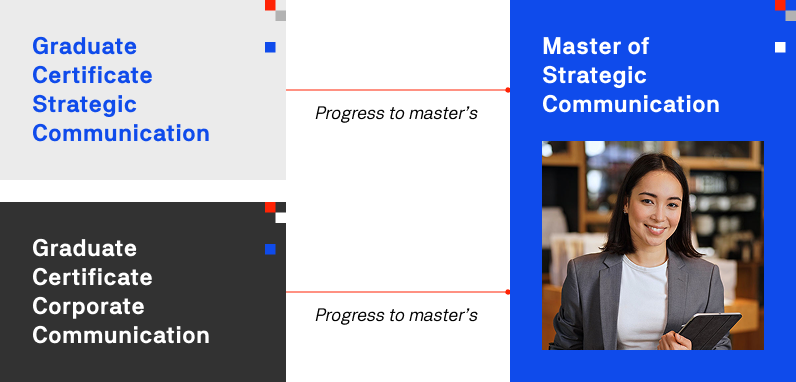Why study the Master of Strategic Communication with UTS Online?
Top 100 University Globally1
Top 5 in Australia for Communication and Media Studies2
5th in Australia for Sustainability3
100% online with support from enrolment through to graduation
1QS World University Rankings, 2026. 2QS World University Rankings by Subject, 2024. 3QS Sustainability Rankings, 2025
Communicating with purpose, leading with impact
Advance your potential to become a leader in the communication profession with UTS Online’s Master of Strategic Communication. Access contemporary course content designed by academic scholars and industry experts to provide you with an engaging and high quality learning experience. Leverage the increasing importance of purposeful communication to drive impactful outcomes in businesses and organisations.
Gain a comprehensive understanding of the strategic role of communication and develop essential skills in intercultural communication, stakeholder engagement, and emergent communication practices.
Explore innovative tools, technologies, and techniques to effectively tackle complex business challenges across a variety of industries. Stay updated on the latest insights in crisis and reputation management, organisational storytelling, and contemporary advertising to craft meaningful messages for diverse audiences.
Apply advanced knowledge and skills in developing, managing, and implementing integrated communication campaigns. Master creative and organisational processes, including formal and informal research, ideation and evaluation.
Who is this course for?
The Master of Strategic Communication is suitable for:
- Corporate communication leaders seeking to enhance their ability to manage reputation, media relations and strategic messaging.
- Public relations and crisis communication specialists who want to refine their expertise in stakeholder engagement, crisis response and brand positioning.
- Marketing and digital communication professionals looking to integrate storytelling, audience analytics and brand strategy into impactful campaigns.
- Government and policy advisors who need to communicate complex information effectively across diverse audiences and platforms.
- Professionals transitioning into senior communication roles who want to build leadership capabilities and gain a strategic edge in corporate or public sector communication.
See entry requirements under course information for eligibility information.
What you will study
The UTS Online Master of Strategic Communication comprises 12 subjects (72 credit points [CP] in total).
Complete the following subjects:
- Understanding Communication in Society
- Intercultural and International Communication
- Emergent Communication Practices
- Driving Stakeholder Engagement
- Communicating Risk, Issues and Crises
- Organisational Storytelling and Engagement
- Contemporary Advertising
- Strategic Campaigns
- Applied Research Methods
- Strategic Communication Project
Note: Most UTS Online subjects are valued at 6 credit points each. For detailed subject descriptions and further information, please download a course guide.
Flexible course options
The Master of Strategic Communication comprises 12 online subjects (72 credit points (CP) in total).
Students who complete the Graduate Certificate in Strategic Communication or Graduate Certificate in Corporate Communication may qualify to advance to the Master of Strategic Communication, requiring only 8 additional subjects to complete the Master's degree.
Graduate Certificate
4 Subjects | 8 months
Or continue studying
Master's
+6 Subjects | 2 Electives | 24 months
Graduate with a Master's degree
One of our Student Enrolment Advisors can assist you with more information, including alternative pathways.
Study pathways
The Faculty of Arts and Social Sciences offers 2 online Graduate Certificate courses to support your career in communications.
The Graduate Certificate in Strategic Communication and the Graduate Certificate in Corporate Communication both provide a pathway to the Master of Strategic Communication.
This allows you to tailor your studies to align with your career goals and develop specialist skills in the areas of communication that matter most to you.
Learning outcomes
Develop and implement high-impact communication strategies
Apply advanced theoretical and practical knowledge to design, execute and evaluate multi-platform communication campaigns. Use data-driven insights and emerging media technologies to address complex organisational challenges with innovation and impact.
Lead communication with cultural intelligence and inclusivity
Navigate diverse cultural, social and global communication landscapes with confidence. Develop strategies that promote equity, inclusion and social responsibility while effectively engaging international and Indigenous communities.
Think critically and creatively to shape public discourse
Analyse strategic communication models and synthesize complex information across various media platforms. Apply critical thinking and creative problem-solving to craft compelling narratives that influence public perception, organisational reputation and strategic decision-making.
Persuade and engage audiences with effective storytelling
Refine your ability to communicate with clarity and influence across written, visual and digital formats. Build stakeholder trust and engagement through ethical, impactful and audience-centric storytelling.
Course information
Entry requirements
Applicants must have one of the following:
- Completed Australian bachelor honours degree, graduate certificate, graduate diploma, master's degree or doctorate, or overseas equivalent, in any field of study
OR
- Completed Australian bachelor’s degree, or overseas equivalent, in Management and Commerce, Society and Culture, or Creative Arts
OR
- Completed Australian bachelor’s degree, or overseas equivalent, in any field of study AND A minimum of 2 years full-time or equivalent part-time, relevant professional work experience#
#Relevant professional work experience is defined as employment within OSCA groups: 01 Managers and 02 Professionals.
Applicants who do not meet the criteria above should consider applying for C11372 Graduate Certificate in Strategic Communication or C11373 Graduate Certificate in Corporate Communication.
Supporting documentation to be submitted with the application
For applicants who need to demonstrate professional work experience:
- Curriculum Vitae AND Statement of service in one of the following formats:
- A 'Statement of Service' provided by the employer
- A completed 'UTS statement of service’ signed by the employer
- A statutory declaration confirming professional work experience (Australian residents only)
- An official letter from the applicant’s accountant or solicitor, on company letterhead, confirming the applicant’s professional work experience or engagement with the business, duration of operations, and nature of the business
- A business certificate of registration in original language and English (e.g. provision of ASIC documentation or ABN or similar documentation for Australian Businesses)
Eligibility for admission does not guarantee an offer of a place.
Want to check your eligibility?
Not only do we have the right tools and support teams to help you – we have people who care about your success.
Career outcomes
The UTS Online Master of Strategic Communication equips professionals with advanced skills to lead communication strategies that influence, inspire and drive organisational goals. This course prepares you to thrive in the dynamic world of corporate, government and non-profit communication.
Upon completion, graduates can explore roles such as:
- Communications Director
- Public Relations Manager
- Corporate Affairs Advisor
- Digital Communication Strategist
- Brand Manager
$120,000
Average salary
Strategic Communications Managers in Australia earn an average annual salary of $120,000, reflecting the financial rewards of advanced expertise in communications.
(Glassdoor)
13.3% Projected employment growth in the next 5 years
According to Jobs and Skills Australia, employment for Public Relations Professionals is projected to grow by 13.3% over the next five years, significantly outpacing the average growth rate and highlighting the growing value of strategic communication skills in the current market.
(Jobs and Skills Australia)
6,000 + job
listings across Australia
As of October 2025, there are over 6,065 job listings for 'Strategic Communication and Engagement' roles across Australia, indicating a robust demand for professionals in this field.
(Seek)
Upcoming intakes
UTS Online courses have 6 intakes per year. The diagram below shows all upcoming intakes. Our next intake is highlighted below.
-
Jan
2026 -
Mar
2026 -
May
2026 -
Jul
2026 -
Aug
2026 -
Oct
2026
Meet our Course Director
“With effective communication becoming ever more critical to success for businesses, Government departments, charities, community groups and other organisations, we have created a program that helps people build the knowledge and skills to develop communication that delivers results and effectively meets set objectives. This program is designed for students who are looking to progress their career and become leaders in the communication profession. Students will embrace a different learning experience that prepares them to thrive in the communication environment now, and into the future.”
Dr Andrew McCowan
Course Director, Master of Strategic Communication
Download a course guide
Download a course guide to explore detailed subject descriptions, entry requirements, pathway options and fee information.
Frequently asked questions
No, a bachelor’s degree is required for direct entry. However, if you don’t meet this requirement, you may be eligible to enrol in the Graduate Certificate in Strategic Communication or the Graduate Certificate in Corporate Communication. Upon successful completion, you can use these qualifications as pathways into the master’s program. Contact a Student Enrolment Advisor at 1300 477 423 to discuss your eligibility.
Yes, students enrolled in the Master of Strategic Communication who complete the first 8 subjects but cannot continue for personal reasons may exit the program with a Graduate Diploma in Strategic Communication.
Yes, you have the option to apply for the on-campus Master of Strategic Communication, which is delivered at the UTS Ultimo campus. This program offers a traditional classroom learning experience combined with the same rigorous curriculum as the online program.
Yes, the demand for careers in communication is significant and growing. For example, jobs in Marketing & Advertising are projected to grow by 21.7% and roles in Public Relations have increased by 15.8%. This growth highlights the value of a career in communication and the opportunities it offers.
A Master of Strategic Communication can be valuable for people who want to advance into senior communication, public affairs, stakeholder engagement or leadership-focused roles. The qualification builds skills in planning, analysing and delivering communication that aligns with organisational goals, capabilities that are increasingly important across industries. Many professionals use this pathway to expand beyond operational communication or PR and move into more strategic work.
A communications degree at the postgraduate level, such as the UTS Online Master of Strategic Communication, provides a structured way to build these advanced skills while studying flexibly.
A strategic communication degree can lead to roles such as communication manager, corporate affairs advisor, public relations strategist, digital communication specialist, campaign manager, government communication officer, stakeholder engagement manager or advocacy lead. These roles exist across government, corporate, nonprofit and consulting environments.
The UTS Online Master of Strategic Communication supports progression into these strategic and research-informed communication roles by strengthening skills in storytelling, audience insight, policy communication and strategic planning.
A strategic communications professional plans, creates and manages communication that supports an organisation’s goals. They often work on audience research, message development, media engagement, stakeholder management, crisis communication, digital strategy and long-term communication planning. Their focus is on aligning communication activity with broader organisational strategy to shape understanding, behaviour and reputation.
The UTS Online Master of Strategic Communication develops these capabilities through a blend of applied learning, strategy, analytics and real-world communication challenges.
A Master of Strategic Communication, sometimes referred to as an MA in Strategic Communication, is a postgraduate qualification that focuses on advanced communication planning, audience insight, messaging, stakeholder engagement and reputation management. It is designed for people who want to understand how communication influences behaviour, public perception and organisational outcomes.
The UTS Online Master of Strategic Communication offers a flexible and industry-aligned approach to these areas, making it suitable for working professionals who want contemporary, practical skills rather than a theory-heavy program.
Public relations focuses primarily on managing reputation, handling media relations and shaping public perception. Strategic communication is broader, it incorporates PR but extends into research, behavioural insights, stakeholder engagement, organisational strategy, digital communication and long-term communication planning. Strategic communication is about aligning communication with overall organisational objectives, not just media outcomes.
The UTS Online Master of Strategic Communication teaches this wider skillset, preparing learners to contribute to communication planning at strategic and organisational levels.
At UTS Online, your success is our priority, and that doesn't change when you study remotely. We're committed to providing you with a comprehensive range of student support services, guiding you from enrolment right through to graduation.
As a UTS student, you'll enjoy access to an array of support services, including:
-
Your own dedicated Student Success Advisor, available to answer any course-related questions you may have to keep you on track
-
UTS Career Hub for work experience and networking opportunities
-
Assignment writing and academic support from teachers & lecturers
-
Peer learning support
-
Confidential medical and mental health services.
Connect with us to learn more about how we support your success while studying for a Master of Strategic Communications at UTS Online.
When studying the Master of Strategic Communication, your online study experience includes:
-
Interactive modules on media strategies and audience engagement
-
Resources to apply concepts in real-world projects
-
Access to academic support and industry insight
Here’s a video example showcasing key features of our online learning platform, including tools designed to enhance your study experience.
For practical tips on balancing your studies with work and life, click here to learn how to achieve your goals. Remember, our team is just an email or call away to support you every step of the way.











